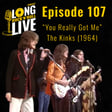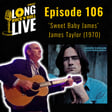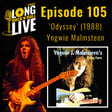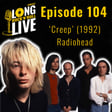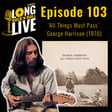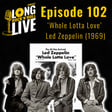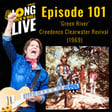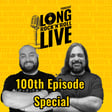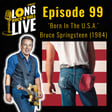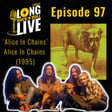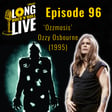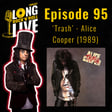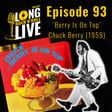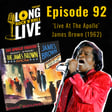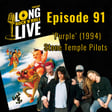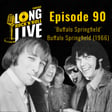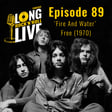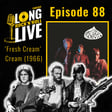Become a Creator today!Start creating today - Share your story with the world!
Start for free
00:00:00
00:00:01

79. Fats Domino
Fats Domino was born in Louisiana on 26th February 1928 to a musical family. He enjoyed and was heavily influenced by the vibrant Jazz and Blues scene of New Orleans in the 1940s. Credited as one of the pioneers of Rock ‘N’ Roll, his music incorporated elements of boogie-woogie, R&B and traditional New Orleans Jazz - creating a sound that was both innovative and accessible!
Episode 79 Playlist: https://open.spotify.com/playlist/3otfynMZ3ikSKUpIMpdOaK?si=ca20b30efe104c41
LONG LIVE ROCK ‘N’ ROLL
#fatsdomino #rocknroll
Transcript
Podcast Introduction
00:00:12
Speaker
Hello and welcome back to the Long Live Rock and Roll Podcast.
Who was Fats Domino?
00:00:16
Speaker
Fats Domino was born in Louisiana on the 26th of February 1928 to a musical family. He enjoyed and was heavily influenced by the vibrant jazz and blues scenes of New Orleans in the 1940s. Accredited as one of the pioneers of rock and roll, his music incorporated elements of wiggy-wiggy, R and&B and traditional New Orleans jazz, creating a sound that was both innovative and accessible. Joining me to discuss the music and legacy of Fats Domino is my co-host, Lister Felipe Amorin. How you doing, bro? Doing great, man. I hope everyone's doing well. Good. Yeah, welcome back to the show. As always, we start off with the terms and conditions. Make sure if you are here listening to us, you like and subscribe if you're watching on YouTube.
00:00:56
Speaker
or if you're listening on Apple or Spotify, do us a favour and go down, give us a rating. It helps us be seen by more rock and roll fans, sends us up the charts and makes sure we listen to by the right people.
Fats Domino's Public Image and Family Life
00:01:06
Speaker
So thank you for joining us again. That's Domino. yeah Where do we start? I mean, should we start with just, ah every let's let's start with the visual aspect. I look at him and I'm happy. Exactly. I get a smile on my face whenever I see him, um just grace my screen. It's just like, I'm a happy guy. I think he is smiling in every picture. Like, I don't I don't remember seeing a picture of Fats Domino that he's not smiling. It's just yeah, it's just like this like beautiful smile. And yeah, and we were talking about about him before we started recording, like, how many like rock and roll stars have like the, you know, that wild lifestyle and a lot of like controversial things that happen in their lives. And Fats Domino was like a regular family guy from from New Orleans.
00:01:56
Speaker
just playing his music. you know audits and its so yeah It's it's iss good to have people like him in the music industries and and and to to know that people like him existed and contributed to music. Because the rock and roll um world was quite wild, wasn't it? You know, um you don't really want to go through every rock and roller that has a criminal record for whatever reason. But I've read, you know, half my research is everyone saying how much of a lovely guy Fats Domino is, you know, humble, um unpretentious, down to earth. You know, those are the kinds of words that people are using to describe him. So.
00:02:29
Speaker
yeah what a guy I mean you you can't just look at that little face and this makes you so happy doesn't it it's crazy because he's got a little baby face isn't it it's like maybe that's what it is he always looks like a baby and to even you know he's obviously a big strong man but he's got a little baby face with that little smile that you just can't help but look at and just bring joy to your day um but anyway um so what we're gonna do is we we've We've given you a companion album to listen to along this episode, and this is called The Best of Fats Domino, which really literally has all of his hits in
Career and Musical Style
00:03:00
Speaker
it. We've put it in the episode playlist. So as usual, for new listeners, each episode we do has a ah companion playlist so that you can listen to the music that we listened to when we were doing our prep and research for the episode. Scroll down, it's in the show notes and you can listen along with us. ah But yeah, what we're doing really this time is it's more of a, just a quick episode about the the the man himself, the music, the legacy, what he was like, his background.
00:03:23
Speaker
um So yeah, it's a bit of a different one from our usual album ones. It's got to be because ah um he released more singles than albums, isn't it? At the time, singles were the the the ah and the main thing for record labels, so they would push for the single to be promoted rather than a whole album. So he was a hit maker, you know, so he was focused on releasing those those singles one after another. and Because it was all you great it it was odd back then to release an album full of, yeah you know, like a 10 song album. You know, for example, what did we do a few episodes ago? We did his Little Richard.
00:03:57
Speaker
which was ah an unusual occasion because it was just a standalone album, like 12 to 14 songs. That's got all the hits. yeah and then no look Yeah, no, you're right, but it wasn't like a compilation, yeah you know, it was it was an album that was released, which is quite unusual for those times when you think about how many hits Elvis released and Fats Domino and everything. But yeah, anyway, right, a little bit of background. yeah I know Felipe's got apparently got some cool stories about and Fats Domino, but just some of the little bits I did. um As I mentioned, he was born into a very musical family um and by the age of, yeah I think he had a brother that played jazz guitar and he taught music theory to Fat Stom, though. And at 14 years old, he was going around playing the bars and pubs in New Orleans and playing the piano and doing his thing. Well, that's at the age of 14 is when he started playing professionally. He was already performing live and singing and playing piano at the age of 10.
00:04:44
Speaker
Right, you sound like you've got this, so you you take us away. No, he started playing at the age of seven. I think his brother-in-law introduced him to a piano. and umm and each of the New Orleans live music scene and, you know, started playing the age of seven by, you know, at the age of 10. He was already playing live and performed. And then when when he was 14, he quit school to focus entirely on his music. So, yeah, quite early in life, isn't it? Yeah. um So career wise, I mean, as you said, 14 years old, so boy in 1928, that would have been 1942 that he moved professionally.
00:05:20
Speaker
Seven years later is when his career took off with the song The Fat Man, isn't it? Yeah. um Did you have anything to expand on? Well, the thing is, before ah his his solo career, he was playing piano for for other musicians. He played with, I don't want to get the name wrong, um he played piano for Billy Diamond so who was a ah a bassist and band leader in New Orleans and Billy was the guy who gave him his nickname so he said he got married and put on some weight and he looked like another musician called Faz Waller so he was like I'm going to call you Faz Domino from now on because it's like it's it's easy to memorize the new name um then and then he became Faz Domino he liked he liked the joke and he liked the idea of being fat domino and he used that in his first single. So he was already well known as a piano player, as a band member, but then he became a solo act and he had, by 1949, he had a good following, like a local following.
00:06:17
Speaker
And then when he put out his first single, The Fat Man, that that was a total hit. and and um and that's And his career took off, and most of his hits were recorded during the 50s and early 60s. So most of the ah relevant songs he he he wrote and recorded were done around that short period of time. although he kept playing until I think until he died. into Oh yeah well he kept pumping out hits throughout the 50s and 60s to be honest um but I've got two songs or three songs that were written the sorry fourth that were um written by him that kind of sort of established a little timeline so 1949 was The Fat Man which was his sort of breakthrough single that got people knowing who he is. Now that
00:07:01
Speaker
That song, The Fat Man, sold one checking i've got it right sold one million copies in four years. press saying That seems nuts to me. In 1949, one million copies in four years. That says something about the music you've released. and to earth going Going Home in 1952, and Please Don't Leave Me in 1953, kind of really got him, established his presence in this jazz, blues, rock and
Fats Domino's Influence on Rock and Roll
00:07:29
Speaker
roll world. And then Ain't That a Shame in 1955 was the the song that took into the next level because it reached number 10 in the Billboard charts. So they're all great songs and there's many more songs done in between those, but those are the four that kind of sort of place nice little markers in the timeline of Fats Domino.
00:07:47
Speaker
One million copies. yeah I can't believe it. It's like one million copies in four years, in 1949. Unbelievable. Yeah, exactly. from So from 49 to 53. So ah it's it's it's insane for that time and established his name and also to meet him a big influence on every every young boy or or girl who was like trying to get into rock music. And like to just just to mention a few names, he was a major influence for Don Lennon and Paul McCartney.
00:08:21
Speaker
for Elvis and ah for New Young. ah Even ah Jimmy Cliff and Bob Marley mentioned him as one of their like major influences. it's not like I think it's amazing when you think of how different all of those artists are. You've got the Beatles, they're like a rock pop. You've got Elvis, which is rock and roll, and you've got Bob Marley and cliff and Jimmy Cliff are a reggae artists. Yet all of them heard something they could take influence from. And if someone has any doubts about the genius of of Fats Domino, um little Richard called him the greatest entertainer ever. So that's from little Richard, right? who's excited to And Elvis, you know, ah called by many people, the king of rock and roll said Fats Domino is the real king of rock and roll.
00:09:07
Speaker
so I think that's it you don't need anything else to be convinced that this man is the the best of the best well that's a good segue into talking about his music and his musical style so I wanted to address the style because it's funny we have so many innovators and pioneers of rock and roll we've got little Richard we've got Elvis did some parts of it you know you've got Jerry Lee Lewis who was a bit later on but he still played a part Yeah, when I, when I did the research this episode, I couldn't help but thinking that they all sound so different. And for me, Fats Domino is, how can I put this, he's almost like a pre
00:09:47
Speaker
It's almost like his music is pre-rock and roll. It doesn't sound heavy enough to be classed as rock and roll. Rock and roll wasn't a thing when it started. Exactly. No, that's my point. But yeah it's like, I want to try and say that Black Sabbath in 1970 started Heavy Metal. But in the years before, you've got bands like Blue Chair, Deep Purple, who would who were making heavy music, but under a hard rock banner. yeah I feel like Fats Domino's early stuff is pre-rock and roll, yeah but yet when I hear it, I still say so obviously rock and roll. and knowm I know I'm being a hypocrite, but does he make sense what I'm saying? oh He does that sounds like he's a little earlier than little Richard and Elvis, but it still works in the overall umbrella of rock and roll.
00:10:29
Speaker
Yeah, it is. And the thing is, there's ah there's a big argument about who is the you know the the father of rock and roll or the first rock and roll artist. A lot of people consider him the that the first one. Some people say it's Bo Diddley because like it's it's ah it's a fine line between blues and rock, isn't it? it's It's difficult. It's really difficult to to to figure out what is blues or rock and roll by that time. So if you listen to ah Bo Diddley, who also like was releasing mainly singles, not albums, yeah um and his albums were compilations of singles. So that is the the rhythm.
00:11:06
Speaker
sounds more like ah what we call rock and roll now this and it wasn't a thing at the time but Fats Domino did that even earlier so that is the point and when you listen to so listen to to the Fat Man, his first single, the vibe is rock and roll so I think it's really hard to go like ah technical about this and and analyze the theory behind it and try to define what is rock and roll based on music theory. yeah Because he's got Boogie Woogie, he's got R and&B, he's got jazz and blues and country. It's all mixed up. And so just mixing all those elements makes you a rock and roll artist, I would say. And he was doing all of that before many many other people were doing so.
00:11:44
Speaker
And I love that sort of when you look at these, um, when you, when you listen, when you take a look at these rock and roll pioneers, it's fantastic. Cause you can almost see the, the, if you, if you look at it as like a maths equation, you can almost see the formula that went in with Elvis. It was gospel plus blues plus country plus boogie with fat. It's jazz plus boogie, boogie, you know, so yeah I love her, but you can hear it as well. You can hear that there's no jazz in Elvis and there's no country in Fats. It's brilliant, isn't it? Yeah, but the think the the thing is, like when you when you are um consider that from Chuck Berry onwards, rock and roll is guitar. So yeah you have Chuck Berry and then you obviously have the beaters and have
00:12:25
Speaker
everyone who comes after that. but And we still relate rock and roll to guitar. If you put an image of a Gibson guitar and say what kind of music does that make you think of, people are going to say rock music. and ah But early rock and roll is piano. So when you think about Little Richard and Fats Domino, that's piano. And the whole attitude, the whole rhythm, the whole vibe, the whole style comes out of his piano playing. you know And he's got that really cool rhythm on the left hand and amazing melodies and solos played by his right hand. So he made, I would dare to say if you, although the band and everything else sounds great, if you remove everything and only listen to his vocals and the piano, it is still rock and roll.
00:13:10
Speaker
Do you know what? i I'm going to disagree with you because because I love that. Yeah. Well, we don't disagree often, do we? I think, well, actually, do you know what? If you were to remove everything except the vocals and piano, but the point I was going to make is compared to someone like Little Richard, Bo Diddley, Elvis, Chuck Berry. Their vocals are eccentric. They're shouting that, you know, Little Richard screaming, you've got Elvis doing his little hole in there, but oh, you know, the rhythmic stuff. yeah Whereas fat is so soft and warm, it's inviting, it's relaxing, it's conversational. yeah It's just, ah that that's what struck me most about the music. isn't it's Yeah, that's what struck me most about listening to him in the in the yeah atmosphere of a rock and roll pioneer is that you think, what does he have that what What doesn't he have that the others do? And he doesn't have any aggression in his voice. He doesn't have any rhythm.
00:14:10
Speaker
in his vocals, the rhythm is definitely in his hands. But how about that contrast between the piano and the vocals? Because but he's like playing heavily on the piano. And the piano is like a drum kit for him. It's hitting it really hard. um And then the vocals are so smooth on top of that. and its its Yeah, it's Yeah, it's the and great comedy. You would think there's two different people doing that. There's a piano player and a singer. Absolutely but that but his piano style let's talk about that for a second because it is just this out and out boogie woogie piano where you've got this sort of repetitive left hand bass pattern going on with his right hand playing sort of syncopated melodies improvisational and I think that that really obviously comes from the New Orleans jazz scene doesn't it and I suppose elements of blues as well but yeah my god what yeah um but if you isolate each instrument in Fats Domino's music
00:14:59
Speaker
you could come to several different conclusions. You could hear the piano and be like, oh, well, this is country. You could hear the vocals and be like, oh, this is soft pop or blues or something. It's just amazing. But when you bring it all together, it's just rock and roll. Well, that's why, you know, that's why he is considered the, ah you know, the the guy who actually created Rock and And I would say, yeah, he he he deserves that that title. to monica Yeah, definitely. Yeah. and and and um yeah and and also like the commitment to music above ever everything else. It wasn't about fame, it wasn't about money, it wasn't about ah you know being recognized as you know one of the greatest. He just wanted to play his piano and sing and have a good time and that energy is passed on to us when when we listen to his music.
00:15:44
Speaker
Oh God, of course, yeah. um And so talking about, you know, we mentioned about obviously him being like a rock and roll pioneer, some of the stuff that sort of historians and music critics can genuinely look back on and say, this is what he did. um Obviously, you've got the hybrid of genres. I mentioned that earlier. Elvis had a set of styles that he turned into rock and roll. Bo Diddley had another set and Fats had another set. um But I thought what was quite important here, and maybe you can talk a little bit about this, is the incorporation of the backbeat and uptempo songs. Because if I'm not mistaken, the emphasis of beats on blues music prior to this would have been on one and three.
00:16:21
Speaker
You could argue that, yes, because because of the early blues stuff that doesn't have the drum kit as like a main instrument. So just for listeners, when we're talking, and there's a bit of music theory here, when we're talking about the emphasis on a beat, when you count bars, your beats, you go one, two, three, four, one, two. If you listen to heavy metal, it emphasizes beat one and three. One, two, three, four, one, two. three four the jazz and rock and roll emphasize the two four one two and more than pop music has this yeah we call it the back beat the two and four being like played played louder or more evidence than everything else in the bar sorry i think you know but yeah but this is like it's it's normally where people should clap their hands i said shoot because most of the clapping one and three it's really annoying but anyways when you hear this nair drum the two and four that is uh uh yeah
00:17:11
Speaker
that's commonplace in in modern pop music and modern rock music. But is it for people like that? Yes, it wasn't so evident until the the pioneers of rock and roll like him. one of the There's a song, I don't know if you can find the year the song is being recorded, but you have quick access to to everything that I know. There's a song, I'm Ready. i'm red it is fats yeah yeah it's a It's a really good example of ah rock and roll because it's it's a straight rock and roll groove. It's not a shuffle, like a swing, feel like jazz and blues. And you have the hand claps on top of of the the beat and it sounds louder than the actual drums in the song. And that's a formula that the Beatles used a lot. Heavy hand claps and percussion louder than the drums, louder than everything else.
00:17:59
Speaker
Did you find it yet? Yeah, so but Fats Domino's was 1959. 59. So that's like, re still really early yeah rock and roll history. Well, Muddy Waters wrote it. Oh, no, Muddy Waters. ah think he wrote it in 54, so four years later Fats Domino covered it in 59. Yeah, so if you listen to his version of it, is got um ah you have the ah the hand claps really loud ah in the mix and that's a formula that's been used after that like a million times by the band. It is track 11 in that best of Fats Domino album, so any song we mention will be in the playlist as I mentioned.
00:18:34
Speaker
One I'm going to add quickly, as you mentioned about Beatles being a massive influence, or Fats being a massive influence for the Beatles, I believe it is well known that the song Lady Madonna is a direct influence from Fats Domino. Paul McCartney, I believe, has come out and said, I wrote this based on Fats Domino's music, so that's pretty strange. Well, you've got the broogie woogie piano, isn't it? Yeah, exactly, yeah. um So yeah, the other other thing that I think is important to talk about, about the innovation and what he did is the use of his full band. Because...
00:19:08
Speaker
In that time, sort of the late 40s, obviously, you know, when you hear Elvis doing his... I mean, Elvis was a little later, but it's a very sparse band, Elvis's band. We spoke about it, didn't we? It was like a 40s, like a very, very... Well, he was like acoustic and they had the one bass and tracks. Bass and electric, yeah. But straight away, in early Fats Domino music, we're hearing the horns. And that has to be an obvious takeaway from the jazz scene that he was influenced by. But the other thing I read as well is that he, and this this will be, then we can go into this a bit in another section, is he had a stable and consistent band for a long time, very few members left.
00:19:49
Speaker
It wasn't like Elvis, who, you know, had a band and then he went on tour and came back and there was another band in the studio, decided that for this single, it would be this band. Apparently, Fats Domino used a consistent, or solid band of the same sort of people. Chuck Berry, to save money, he would use a different band in every country he was touring. so Yeah, it's a bit clever.
00:20:09
Speaker
But yeah, so yeah, so interesting to know that Fats Damer was loyal to his musicians and kept the band together. Actually, that helps to shape the sound of your music, doesn't it? Oh, yeah, because you I mean, you may know how many projects have we been in together that when you stay in a project for a long time, you start to understand what the artist or the lead singer or the guitarist wants to do with the music. And as you get to know that person, you sort of shape your playing around it yeah instead of just turning up to a gig saying, play this, please. You learn to understand what the artist wants. It's like the band becomes an extension of the artist's character. Yeah, exactly. Yeah.
Personal Stories and Favorite Songs
00:20:42
Speaker
Excellent. right Well, I think we've covered all the musical stuff, really. um did You said you had a story you wanted to tell. Oh, no, there's an interesting story about, um um was it Hurricane and in in New Orleans? in When was that? Go on, you tell the story. I'll look for you. Yeah, because that was a hurricane that pretty much destroyed ah the the whole city. because they Could it be 47?
00:21:06
Speaker
No, no, no. Later. Yeah, yeah. I mean, more recently, you know. OK. Well, you carry on. I'll find it. Yeah. So wings yeah you mean Katrina? Yeah. Yeah. That was two thousand. That's the one wasn't it? Two thousand and five. Yeah. So um so that, you know, that was a disaster for for for New Orleans, wasn't it? And and his neighborhood was really affected by it. Flood ah during that hurricane and everything. And um they've managed to save him immediately but the piano couldn't ah be saved so he's he had this beautiful white piano that was with him for years and they couldn't save it so it was underwater for like a few days I guess and they've managed to recover it and a lot of people including Paul McCartney ah donated money to to restore the piano
00:21:54
Speaker
um Yeah, it's beautiful. it smells my heart man So I think he's in a museum. or so I don't know where he is, the piano, but he's in a museum or something like that. I think he's in the Rock and Roll Hall of Fame Museum, I guess. I don't know. I'm not going to say where he is because I don't know. But yeah, for so but it's interesting. Like, ah ah so he was, you know, still, I think he was still performing and he and and he lived a long and happy life. It's good. It's good to say that about somebody rock music. Fantastic stuff. um Right, so I think that nicely sums up ah yeah what the the music of Fats Domino, the legacy he's kind of left, who he's influenced, what he did towards the pioneering of rock and roll. What we're going to do now is myself and Felipe have both chosen a song that we want to just talk about. I think it's not going to be long, it's going to take a few minutes.
00:22:37
Speaker
But um yeah, we're just going to talk about a song, we our favorite one of Fat's Domino and why we like it and how it links to everything we've said. So do you want to kick off? Oh yeah. Yeah, well, I'm going to start from the first thing that we already talked about, the the Fat Man. I think this song is so rock and roll and so great and it's my favorite Fats Domino song for a million reasons. First because it it it describes himself times and is so it's there's like about 45 seconds of piano playing. there is There's more instruments in the background but the the mix and the recording so poor you can barely hear anything but yeah those 45 seconds of piano, his whole style and and
00:23:21
Speaker
and legacy, it's it's all in there, you know, the strong bass lines on the piano and and the melodies. And it's just like, it's so infectious from the beginning, really groovy, really steady. And when it starts singing, I love the lyrics, like, they call me the fat man because I weigh 200 pounds. all the girls they love me because I know my way around and it's like seriously yeah I'm fat and don' I don't give a fuck ever everyone loves me it's so cool and it's is's so cool and then it finishes the the first it's not only about two verses and it finishes singing and it starts doing your vocal solo just saying wow wow wow like I love that part it is like how big a row is that
00:24:03
Speaker
He could have done anything. He could have used the harmonica. Frank Zappa uses the kazoo. Yeah. But he just, he's like, wow, wow, wow. Why is that? Why they say just, yeah, there's a vocal solo. Like, and after that song, it comes another piano solo and it's just smashing it. Unbelievable. And it's great. It's so infectious. You just want to dance to it. So I totally recommend that song. If you never heard of Fats Domino. Yeah. You want to you want to listen to him start from the first hit, the first single. Yeah. Fat Man. a Great song out there. How about you, a man? What's your favorite? so I've gone for Blueberry Hill because it is the song that got me into Fats Domino and it you might... is it too much of a stretch to say it's the song that got me into rock and roll? Probably not. It probably is the song. Now what I love about it is you've got that blues pattern and rhythm in the left hand, the doom.
00:24:50
Speaker
but it did it it it but But then in the intro, the melody in the right hand, he's just messing around like did it idiot it did li did da da da dade do like just doing the melody, very boogie woogie style, very improvisational. The soft, warm voice, the simplistic melodies. And I think, as I said already, the horns. He uses them so well because in ah in ah in a song where you're in control of the rhythm and you've got the band looking after the chords, it's so easy to put a saxophone or a trumpet in there and say, go on, take the spotlight. But the the horns, all they do is just gentle swells. Listen to it. Sometimes you can't even hear it. Just gentle swells behind the vocals. I love that there's no shuffle in the drums.
00:25:37
Speaker
But the song swings, doesn't it? Yeah, it's very good. But there's no shuffle in the drums, which is where the shuffle should be. Interesting. But my favourite part of it, and this is what... I don't think it's a secret, you know, you and me have discussed it. I don't mind the blues. I think the blues is great. It's such an important part of music. It's so vital, but it's not my favourite genre. I find it a little bit repetitive in places. No need to go on. You've been listening to the wrong blues stuff, man. Yeah, there's an argument for that. There's an argument for that. But for me...
00:26:09
Speaker
where there's a part in Blueberry Hill where it goes off of the blues progression. yeah And it goes, there's a minor chord, there's a bridge, but all of the vowels, and there's like a minor chord comes in, he goes, we made, and it's like this tension's just there, whatever to be, and then it releases, and we're apart, and it just falls so beautifully. And I just thought, In that little chorus, you've got everything. You've got the horns playing that blue note or the dissonant note, whichever one it is. You've got that minor chord that just deviates away from what we expect with the blues. It's very jazzy. It's very unusual. His soft voice. That that bridge part, chorus, whatever you want to call it, is just stunning. um And I think, yeah.
00:26:56
Speaker
I think we, I think it's funny you said this because you're like, we should, we should pick two songs to do. And I was thinking, well, I'm doing Blueberry Hill and I think Felipe should do the fat man. And Felipe was like, I want to do the fat man. So we've done the most perfect two songs. um But yeah, amazing stuff. So I think we've sort of summed up most of the stuff really. I mean, there's one little section I want to do now, which um I want to ask. And I think this is important because it's so easy to lump all these guys in together.
Fats Domino's Musical Legacy
00:27:25
Speaker
Elvis, Lil Richard, Bo Diddley, Fats Domino, I wanted to ask, or I did ask myself before I was doing the research, what makes Fats stand out? And the sort of conclusions I came to is that
00:27:36
Speaker
Other rock and roll pioneers, they drew from country or straightforward blues, whereas Fats drew in from the jazz, very deep rooted in the jazz and R and&B of New Orleans. um Piano is a lead instrument, you've already touched on that. The smooth vocal delivery compared to what I was saying about Little Richard, Bo Diddley, who were very raw, energetic, aggressive even to an extent. yeah um And this is an important point for me that actually that we didn't mention. Why does Fats music, why did it last the test of time so long compared to the others? He co-wrote with a gentleman called Dave Bartholomew all the way through the 50s and 60s.
00:28:16
Speaker
and you hear all the time about Elvis's relationship with this songwriter and this producer and how this broke down and that and the same with Little Rich and Bo Diddley but Fats found a formula in his band and with this Dave Bartholomew guy that worked. Yeah. And he stuck with it. And the result is the massive success that he has found. I mean, his music transcends the genre boundaries. You can't. Obviously, it's rock and roll, but a gospel fan would like it. A blues fan would like it. A jazz fan would like it. That's good music. I want to say one thing. if If anyone who's ever had a nine to five job or a job that you don't like, but you need the money, if you listen to Blue Monday, there's no way you're not going to relate to that.
00:29:01
Speaker
And it's like, you know, ah the whole thing, the whole week is a mess. You don't want to do any of that. And then Saturday, you have having a good time and you have a headache on Sunday. It's just it's just like it is worth it because so. So it yeah it does his music um you know lyrically and melodically and everything. it It does speak to the common people and it just brings a good vibe. the thing well we We mentioned the um that line between blues and and and rock music. Sometimes people talk a lot about chords and and and melodies and rhythm, but one big element is the lyrics. Fats Domino's music is mainly like uplifting and and and happy, so it's not bluesy because you've got to feel miserable to sing the blues.
00:29:49
Speaker
Yeah. And if you want to if you want to sing rock and roll, especially early rock and roll, you've got to be having a good time. You're happy about your life and you're surrounded by friends, maybe with the same songwriter collaborating with them, same band, you know, the same people around him. Maybe he just felt like he was surrounded by friends. Listen to the song. What a party, which if makes you feel like you are in that party with him and his friends. and I think. I think. from what we've read about him as a person I think his music reflects that and obviously like you said there are songs that are a bit more mellow and unhappy lyrically yeah but but mainly you hear it and you still just think of his fat little face and I mean that in a lovely way but you just think of his little face just there with a smile
00:30:38
Speaker
Honestly, I think his music, is is ah it's a testament and reflection of what everyone has said about him. And he is a true rock and roll icon. And he died in 2017 in Louisiana, where he was born at a fantastic age of 89. Wow. Yeah, lived a great life and left a great legacy. It's more than great, bro. I think it's yeah more than great, isn't it? It's historic. It's important. It's monumental. it's And I don't know why sometimes when people talk about, you know, I've been, you know, ah I've listened to a lot of people talk about Chuck Berry and Little Richard. And sometimes I'm like, how about Fats Domino? You need to you need to mention this guy. Rock and roll wouldn't exist as it is without him. That's that's a fact. Well, this is what I was alluding to earlier. I think I think
00:31:30
Speaker
If you analyze it musically, I think there may be slightly too much. i see I'm trying to make a point. I don't even know what point I'm making. it's There might be slightly too much blues or slightly too much New Orleans jazz, maybe slightly too much piano for for it to sit. It's exactly the same what I said with Sabbath. A lot of people think Deep Purple are a heavy metal band or played the first heavy metal music. But history tells us 1970 Sabbath did heavy metal. But, but everyone still knows Deep Purple were kind of doing it very similar before. And I think this is the case with Fats Domino. It is obviously rock and roll. It is obviously a precursor rock and roll, but it just sounds a little lighter than the rock and roll we got for Little Richard Chuck Berry. And maybe that's because of the piano or something. But undoubtedly, it's not like there's a debate here. He is rock and roll. It's just about how rock and roll I think. you know but
00:32:23
Speaker
so Anyway, right.
Podcast Conclusion and Audience Engagement
00:32:25
Speaker
Anything else to say? We could wrap it up there. ah i know I'm just really happy because because I can see the the pictures of Fats Domino on my background. Can't stop smiling. He's a sort of happy guy. yeah i And always with the piano, like nine or ten pictures of him his but is is like sitting in front of his piano, like every time you you you look at, you know, you go on Google images and type Fats Domino, you're going to find a piano. Yeah, do you know what he reminds me of? I'm just looking at photos. It's almost a bit like Oscar Peterson, the jazz pianist, who's just always at the piano. And always smiling as well, actually. Anyway, right, let's call it a day. Thank you again for joining us on the Long Live Rock and Roll podcast. I said it at the start, but I will say again, if you've enjoyed this content, please leave us a comment. Tell us your favorite Fats Domino song, favorite Fats Domino album.
00:33:13
Speaker
um if you're watching on youtube please hit like so that our video gets shown to other people and subscribe so that you stay up to date with all of our content and new videos if you're listening on apple and spotify do us a massive favor it takes 20 seconds of your time that means the world to us scroll down give us a review hit five stars write a little comment and it means we're going to be seen and listened to by more people because the review you give us sends us up the charts it says oh this these these guys are apparently good because someone's given them a review let's show them to more people and it would mean the world of it would make the world of difference to us so we'd appreciate if you did that but thank you for joining us again and we'll be back soon.
00:33:49
Speaker
Yeah, thanks for all the support so far. And if you like ah not only classic rock or modern rock, like rock and roll, early rock and roll, we have a lot of episodes about other rock and roll artists. We've covered Little Richard, Bo Diddley, Elvis, all of that. So listen to those episodes as well. Thanks for being with us. um You know, keep on rocking everyone and don't do anything I wouldn't do. I will just add one more thing before I sign off. As Felipe has said, if you're a new listener, we're doing Fats Domino, so 1949. And we've got we go all the way up to what Audio Slave in 2006. I think that's the most recent album we've done. We do everything in between. we've got This is the 79th episode. We've got loads of episodes before. Metal, country, pop, rock and roll, blues, it's all there. Go and check it out and stay subscribed to stay up to date with our content.
00:34:38
Speaker
So I'll finish off with the normal thing, which is long live rock and roll. We'll see you soon.
